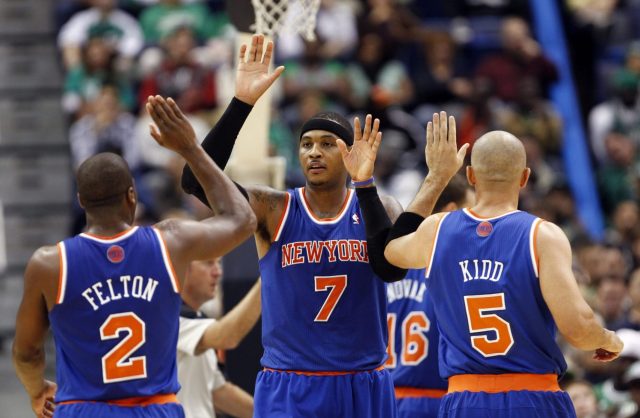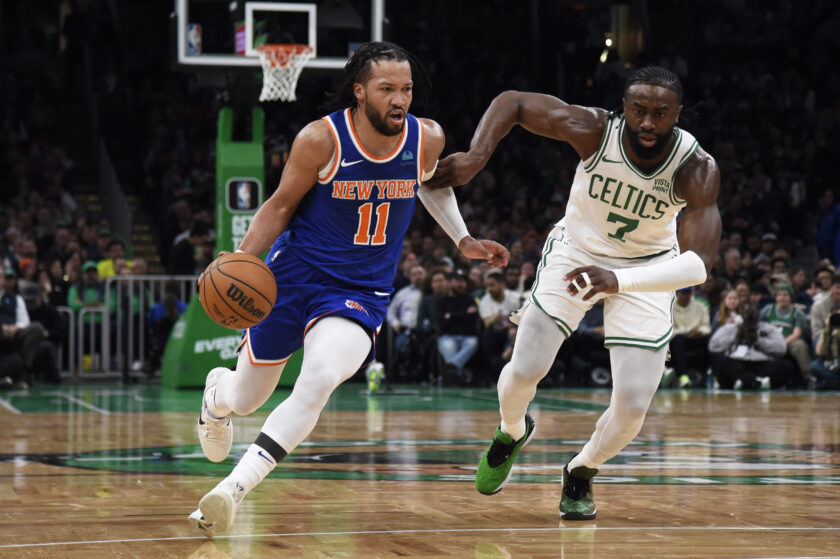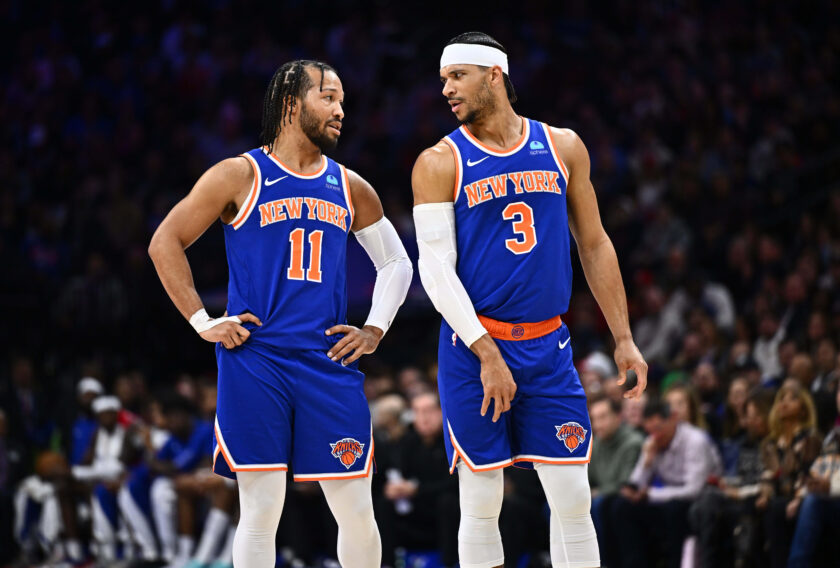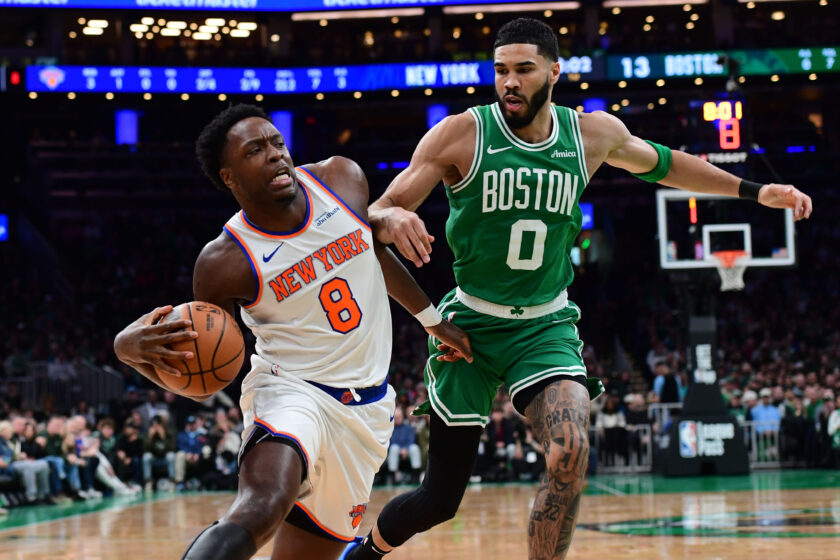Those Were the Days: The Last Time the New York Knicks Were a Contender and How it All Went Wrong

We get teary-eyed as we look back at the last time the New York Knicks were contenders with Carmelo Anthony and how it went all wrong.
[dropcap]L[/dropcap]ast week, a friend asked me two questions: “What is your favorite sport and who is your favorite team?”My answers were slightly contradictory. My favorite sport has been soccer for quite some time. My desired profession? Soccer commentator. My biggest life goal? Commentate a FIFA World Cup game.
However, my favorite sports team is, and always will be, the New York Knicks.
This horrifying answer brings me to the subject of this article: the 2012-13 New York Knicks season, which is still, arguably, the best seven-month span of my life. If I had to pick between reliving the Giants Super Bowl runs in 2008 and 2012, or the 2009 Yankees title winning season, or the 2012-13 Knicks, I’d choose the latter every time.
And they didn’t even win the title. [sc name=”Knicks Center Right” ]
To their credit, they did go 54-28, win the Atlantic Division, finish second in the East (only behind defending and eventual champions Miami, against whom they went 4-0 in the regular season) and win their first playoff series in 13 years before being bounced out of the playoffs by Paul George and the Indiana Pacers in six games.
There are so many reasons why I loved the 2012-13 Knicks. It was the first time in my life the Knicks were (arguably) title contenders. It was seven months of Carmelo Anthony 30-point games, Mike Breen yelling “Bang!,” Tyson Chandler alley-oops, Jason Kidd clutch threes, J.R. Smith competence, ferocious defense, unconscious three-point shooting, and big win after big win.
Most importantly, the 2012-13 Knicks were fun. They made me proud to be a Knicks fan, not ashamed. That pride was short-lived, however, it only took a year for everything to fall apart — 12 months after clinching the Atlantic Division, they failed to qualify for the playoffs. A season after that, they had the second-worst record in the NBA. Over the next two seasons (this and last), they tried a quick rebuild over the summer that would hopefully land them an eighth seed (they failed).
The heartbreaking thing about the 2012-13 Knicks is how everything unraveled almost immediately, and now, four years later, the Knicks have returned to their rightful role as the laughing stock of the NBA.
So let’s relive the magical season that once was, and reflect on how a team that played with such passion and flare was disbanded almost immediately upon said season’s completion.
Was I optimistic about the 2012-13 Knicks? Yes, and no. The 2011-12 Knicks were, to put it bluntly, disappointing. They went 36-30 in the lockout-shortened season, before falling to eventual champions Miami in 5 games. There were highs– Linsanity, Tyson Chandler winning defensive player of the year, ‘Melo dropping a 40 spot on the Heat in game 4 to give the Knicks their first playoff win since 2001– but overall, finishing seventh in the East before being cannon fodder in LeBron James‘ march towards his first NBA title did not leave a sweet taste in this Knicks fans mouth.
Neither did the offseason, at first. While the Knicks did right in my book by getting rid of Toney Douglas and Jared Jeffries, (quick side note: my father, who introduced me to the Knicks, is more passionate a fan than me and has experienced an extra two decades of Knicks-related heartbreak, hated Jared Jeffries more than anyone on the planet. The Darel household became a significantly better place once Jeffries left) they made several questionable decisions.
First, they lost Jeremy Lin. How cool would it have been to see the Knicks run out Lin, Melo, Amar’e Stoudemire, Tyson Chandler and some schmuck to play shooting guard until Iman Shumpert‘s torn ACL healed? I mean sure, Chandler would have to guard five positions, and somehow three players would have to take 20 shots a game, but it definitely would have been entertaining. Instead, they let Lin, who looked like the second coming of Chris Paul, walk to Houston.
They also signed Jason Kidd (at the time, 39), Rasheed Wallace (at the time, 38), Pablo Prigioni (at the time, 35), Marcus Camby (at the time, 38) and Kurt Thomas (at the time, 40, and the oldest player in the NBA) to the roster, ballooning them to the oldest collective team in the Association.
They then went and traded for Raymond Felton, who was terrific for the Knicks in 2010-11 before being shipped to Denver in the Carmelo Anthony deal, but turned into one of the most hated players in Portland Trail Blazers history a season later, to replace New York’s ex-sweetheart, Jeremy Lin.
To add insult to injury, Amar’e Stoudemire and Iman Shumpert were hurt heading into the season. The oldest roster in the NBA, minus two key players, missing a departed Jeremy Lin … it was safe to say expectations were not high for the Knicks. The entire league community had begun booking travel for what seemed like the inevitable Finals matchup between LeBron and the Heat, and the newly put together Lakers super team, that boasted a lineup of Kobe Bryant, Steve Nash, Pau Gasol, and Dwight Howard.
But somehow, it worked. The Knicks started the season by ripping through defending champion Miami 101-84, behind 30 points from Carmelo Anthony, and 19 made three pointers.

The staggering start continued — the Knicks kicked off the season by going 6-0, including a 104-100 comeback win at San Antonio. They got off to an 18-5 start. They didn’t lose a home game until December 17. They beat the Heat by 20 points in Miami. Jason Kidd was undergoing a career renaissance. Carmelo Anthony went on a scoring tear, including 45 point outbursts against Brooklyn and Portland. JR Smith was a force off the bench, Tyson Chandler a titan in the paint. The Knicks were playing tight defense, they were shooting the lights out from three-point range, and most importantly — they were winning.
The rest of the season, minus a few road bumps, went just as smoothly. Carmelo Anthony led the league in scoring, thanks to a streak of 31 straight games with over 20 points, spanning from mid-November to early February, and a span of five games in April where he scored over 35 points in each, including when he dropped 50 against the Heat.
Other things that went right for the Knicks during the season:
-Tyson Chandler tied a franchise record by recording three consecutive games of over 20 rebounds
-The team collectively tied a franchise record by hitting 20 three point shots against the Wizards
-With a win over the Thunder in April, Mike Woodson‘s record as Knicks coach improved to 68-32 over his first 100 games, the best mark in franchise history
– The Knicks set an NBA record with 891 three-point shots made in a single season (on 2,371 attempts, also an NBA record)
– They went 12-6 in March, the first time the Knicks had a 12-win month since 1994
– They won 50 games for the first time in 13 years
– The won the Atlantic Division for the first time in 19 years
– They racked up a 13 game win streak from March 18th to April 9th, their third longest in franchise history, and longest in 19 years
– They clinched the second-best record in the Eastern Conference and home court for the first two rounds of the playoffs
– JR Smith was named Sixth Man of the Year
Yeah, the Knicks did that. The same Knicks that had started Chris Duhon at point guard three years prior and Langston Galloway three years later.
It’s difficult to pinpoint where it all went wrong for the 2012-13 Knicks, who jumped out to a 3-0 lead against rivals Boston in the first round of the postseason. A smart bet would be when J.R. Smith elbowed Jason Terry in the face in Game 3 against TD Garden. Smith was suspended for Game 4 (which the Knicks lost in overtime). He returned in Game 5 a different player, going 3-14 in a Game 5 loss. In Game 6, the Knicks almost had the biggest collapse in NBA playoff history, blowing a 75-49 lead by allowing 20 straight points, and eventually seeing their lead cut to as little as four points.
They squeaked by Boston in Game 6, before dropping Game 1 at home to the Indiana Pacers, who went on to win all three games at their place to clinch the series in six games, ending New York’s magical season. The Pacers series was difficult to stomach — J.R. Smith was a shell of himself all series. Tyson Chandler was physically and mentally demolished by Roy Hibbert. Paul George out-fought Carmelo Anthony and Frank Vogel’s team stifled the Knicks explosive offense — the Knicks scored over 100 points once in six tries.
Were the Knicks legitimate title contenders that season? I’d have to say they were, for several reasons. First, the vulnerability of the Miami Heat — as previously stated, the Knicks went 4-0 against the Heat in the regular season. Miami also needed seven games to knock off those pesky Pacers and was a Chris Bosh offensive rebound and a Ray Allen three away from falling to San Antonio in six games (it took 7 to beat them as well).
Do I think the Knicks could have taken the Heat in a seven-game series? Well, I had this fantasy scenario where the Knicks stole a game in Miami and were up 3-2 heading into Game 6 at the Garden when the greatest sequence in Knicks history would take place:[sc name=”Carmelo Anthony Player Page” ]
1. Steve Novak would hit a three-pointer with a minute left to give the Knicks an eight-point lead. The crowd would explode, and Mike Breen would let out the most jubilant and surprised “Bang!” you’d ever heard (I’m almost positive TNT had the rights to the East Finals in 2013, but like I said, this was a fantasy).
2. The Heat would quickly inbound to LeBron on the break, who would go up for a stuff, only to be rejected emphatically by none other than Carmelo Anthony (yeah I know, Carmelo playing defense, and LeBron getting stuffed on the break rather than being the stuffer? Again, total fantasy).
3. Ray Felton would take the ball up the court. Tyson Chandler would set a pick and roll to the basket, where Felton would find him for the most emphatic, dagger, “exclamation point!” of an alley-oop that you’d ever see. The Knicks go up 10 (104-94 — yeah, I even had a scoreline in this fantasy) and close out the game to head to the NBA Finals.
The crazy thing about this fantasy, other than Novak being on the court in crunch time, Carmelo playing defense on LeBron and winning and Raymond Felton making a clutch play, was that I actually believed it could happen. The Knicks had such a swagger that season, that 15-year-old Skylar genuinely believed they had a puncher’s chance against the Big Three.
The most heartbreaking thing about the 2012-13 Knicks was their incredibly narrow window of opportunity. So many things would have had to go right for the Knicks to win the title — a fountain of youth type season for Jason Kidd, a consistent J.R. Smith, Carmelo consistently scoring at an elite level, a renaissance for Raymond Felton, sustained three-point success from players like Chris Copeland and Steve Novak, strong defense led by Tyson Chandler — all those things happened, at once, but all the magic sort of faded at once. The Pacers series was where it all fell apart at the same time: Kidd lost his sustainability, Smith lost his consistency, Felton stopped being able to run the offense at a high level, the threes stopped going in, Carmelo struggled to put up 35 a night when he badly needed to, Copeland and Novak disappeared and Tyson Chandler became a shell of himself — all at once!
The 2012-13 Knicks remind me of 2015-16 Leicester City in the Premier League. So many things had to go right at once for the relegation favored Foxes to defy all the odds, upset the football oligarchy, and win the title, from Vardy’s goals, Mahrez Magic, gargantuan defending from Huth, Morgan, and Schmeichel, career years from Marc Albrighton, Danny Simpson, and Christian Fuchs, as well as the diamond in the rough addition of N’Golo Kante. And it all happened! As a result, Leicester won the league. For the Knicks, however, the magic simply just ran out.
The descent back to the futility was swift — Felton and Smith were shells of themselves a year later; Stoudemire and Shumpert never quite lived up to the hype; the Knicks acquired train wreck chemistry killer Andrea Bargnani; Kidd retired; Mike Woodson lost his touch, and his favor with the Knicks brass; Tim Hardawy Jr. was far from overwhelming as a rookie first rounder. A season later, Tyson Chandler was traded — six months later, so were Smith and Shumpert. Stoudemire’s contract was bought out. All the pieces of the 2012-13 Knicks have been disbanded — some are retired, others have won titles since, others somewhere in between.
All that remains is Carmelo Anthony, wasting away the last years of his prime with an inept organization.
My final reflection on the 2012-13 Knicks is a mix of fondness and resentment. The 2012-13 Knicks season was, like I mentioned 2,000 words ago, one of the best seven-month periods of my life. The joy and excitement the 54 regular season wins brought me, along with the 6 playoff wins, cannot be understated.
But I resent the fact that this team was put together with a prayer that somehow, they would conjure up some crazy magic that would help them all the way to their first title in nearly half a century, and how agonizing it was to see their tiny window of opportunity slam shut.
The magic came, but the magic left. And here we are four years later and the magic hasn’t returned since.
[sc name=”Knicks Link Next” link=”https://elitesportsny.com/2017/03/12/new-york-knicks-the-latest-remarkable-achievement-by-kristaps-porzingis-highlights-his-improvements/” text=”KP’s Remarkable Achievement Proves Progress” ]Staff Writer at Elite Sports New York. Lead Writer at New York Sports Hub and My Weekly Sports. Twitter, instagram: @skylardarel. Avid fan of the Yankees, Knicks, Giants, New York City FC, FC Barcelona, and Arsenal FC. Sophomore at the College of New Jersey, studying Communication. Aspiring play-by-play commentator. Grew up in Manhattan, and proud to know how to work the Subway system.





